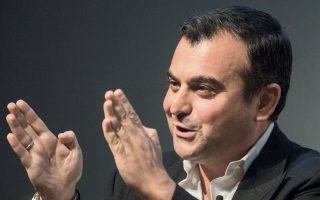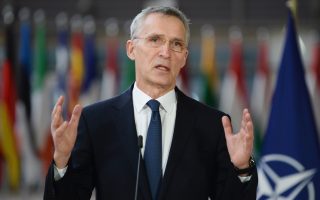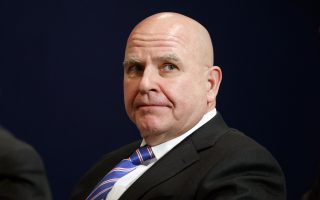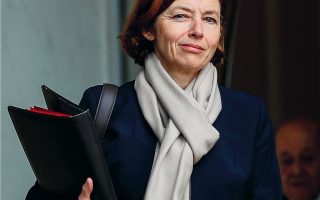Europe needs an autonomous defense mechanism
French expert on Islamism, the Middle East and North Africa speaks to Kathimerini on publication of latest book
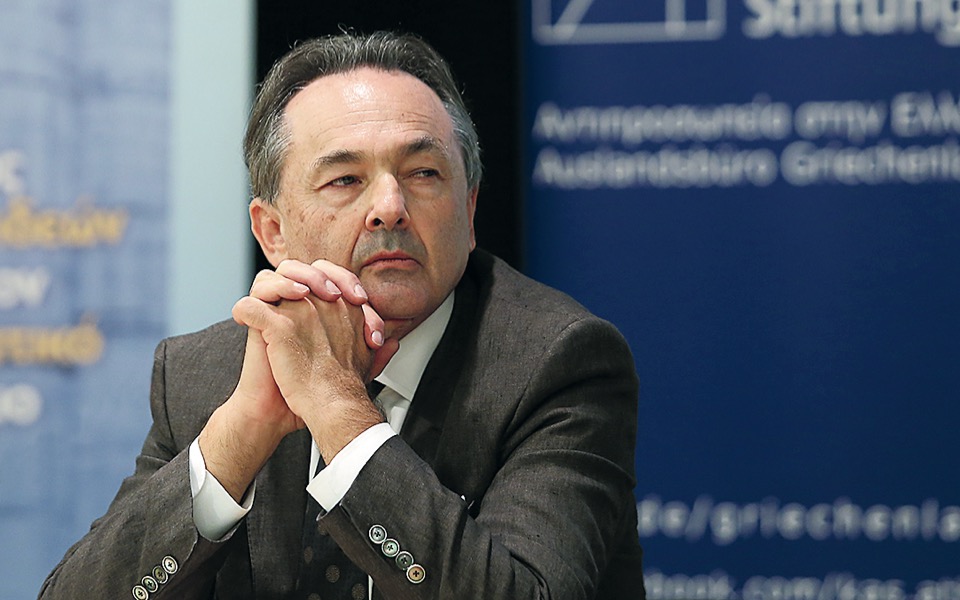
Europe must immediately set up an autonomous defense mechanism as the US is no longer interested in the Eastern Mediterranean region, says author Gilles Kepel, an adviser to French President Emmanuel Macron and one of Europe’s leading scholars on Islamism. In his latest book, “Alliances and Ruptures,” the French political scientist also explains the way the Abraham Accords are changing the map of the Middle East and the Eastern Mediterranean and says Turkish President Recep Tayyip Erdogan has been calls “marginalized” as a result of his policy.
Regarding the recent harassment of the research vessel Nautical Geo by a Turkish warship east of Crete, why do you think Ankara chose to act this way, and what can we expect as a possible reaction by other powers, like France or the US?
Well, Mr Erdogan has a long history of trying to test the waters, if I may say so, in the Aegean Sea and in the Mediterranean. He had been rather quiet this last year because Turkey is facing tremendous difficulties domestically with the drop in the Turkish lira and because he has his own problems with Russia now, in Syria particularly, where the Turkish-backed Syrian jihadist militias are being checked by the Assad militias backed by Russia.
Also, there was the very successful meeting in Athens [on September 17] of the new MED9 group, and, definitely, Erdogan believes he is in a situation of weakness. So I think that he now needs to show his own populist and particularly the super-nationalist components of his coalition, that he is still the Erdogan who turned Hagia Sophia into a mosque last year.
I am not sure this can go very far because he lacks a lot of following, but also this is something that has to do with the aftermath of the Kabul flight – i.e. the US has demonstrated that it is not interested anymore in what happens on this side of the Atlantic. They are now refocusing on the Southwest Pacific, so maybe NATO, the North Atlantic Treaty Organization, will be replaced by the South Pacific Treaty Organization, or whatever it will be called. And so this creates a vacuum. And Mr Erdogan, who’s keen on taking action when there is a fourth line, maybe wants to benefit from that. And this is also taking place at the time when the United Nations General Assembly is happening in New York, mostly in absentia or online. So he may have thought that this was a good time for him to act. I think it is not very wise because the European Union has reacted against that, and two new members have joined the MED7, Croatia and Slovenia.
[Angela] Merkel, who had played down Erdogan’s threats last year, is on her way out. She is now a lame duck chancellor. There is far more awareness in Italy by [Mario] Draghi’s government than was the case where [Giuseppe] Conte, his government last year, that the threats in the Eastern Mediterranean and the attacks against EU member-states are not acceptable. And also, President [Emmanuel] Macron is going to be, as of January 1, the president of the European Union, because it’s going to be a French presidency. So maybe President Erdogan wants to show some advance warning, but I’m afraid that it will not be met with much terror by his adversaries.
Are you also expecting some incidents in Cyprus’ exclusive economic zone, also taking into account the fact that Turkey is supporting a two-state solution for the island?
Well, I’m not sure that this big issue about the economic zones and the EastMed gas pipeline is that relevant anymore because there was greater enthusiasm for the EastMed pipeline over the last years. But fossil fuel energy is now being significantly challenged after Covid by renewables, particularly in the Middle East, where the Saudis are now having their Neom project, which is going to produce green hydrogen.
The Emiratis have been following suit and also, from what people in the know say, there is not enough gas in the Eastern Mediterranean, even proven reserves of gas, to build a very costly pipeline.
So Mr Erdogan had invented this sort of Turkish east Libyan joint economic zone so as to make the pretence that you can cut the pipeline, or levy taxes. But probably, as of today, there are no chances that there would ever be such a pipeline. So I do not believe this is still a very timely issue, a very significant issue.
Do you sense that France is getting over the initial shock created by the AUKUS agreement? And do you think this will work as a spark for Europe to somehow generate a more active and more coherent defense and foreign policy?
Well, the AUKUS agreement was something that caught, to some extent, France by surprise, because France is a member of the Western coalition, is an ally of Australia, of America and of Britain. And this was clearly done behind its back. It was stabbed in the back.
But this is not the only significant point because the AUKUS issue or so-called AUKUS agreement took place a few weeks after the Kabul pullout. And it’s not an issue of France losing a contract, and this will be dealt with by international arbitrary institutions. And the Australians will have to pay a significant amount for breaking the contract.
But this is also a sign that, as happened in Kabul, the US does not even take its allies in Europe into consideration. I mean, in Kabul, for instance, the Italians were furious after the Kabul pullout because they invested a lot of money and they also sent their soldiers. Some of them were dead in Kabul, and they were not even warned. And this, of course, was something that has led many in the EU, including at the MED9 meeting in Athens, to give second thoughts to what is happening in terms of relations between Europe and America.
Not that anyone wants to break away from NATO. Like when President Macron said that NATO was brain-dead, he meant that it did not have any coherence. NATO was built against the USSR and the Warsaw Pact. Now there is no more Warsaw Pact, and there is a significant member of NATO, Turkey, which has bought Russian S-400 missiles. So what is the cohesion and the coherence of NATO is a question mark.
But let us not think that we want to break with the US. We are close allies of the US, I believe, and no one in his right mind in Europe denies that. But we have to be able to react for our interests, our own interests. If someone in Moscow wants to eat, is hungry, and wants to eat a bit of Finland or what have you… And then if we call Uncle Sam and he says, “Sorry guys, call me later, I’m busy with China.” Definitely, we cannot feel secure with that, and we need to be able to build some sort of an autonomy in Europe in terms of defense and security in a more cohesive foreign policy than we had now.
On that front, should we expect some more initiatives from President Macron and should we expect a more pivotal move from Germany?
Well, as you rightly noticed, we are facing a number of very important issues at the European level. Mrs Merkel is leaving. Macron’s term ends in April 2022. It is not a big secret that he will, in all probability, run for re-election. If the elections were taking place today, he would be re-elected. I don’t know what will happen at the time of the French elections on April 10 and 24, but hence it is a big issue. It is a defining moment for the European Union. At least, I believe, in terms of security.
There are two significant military systems left in the EU after Brexit; the French military, which is the only one which is equipped with nuclear weapons. Then you have a very significant navy force in Italy. You have an air force in in some northern countries, from the Netherlands to Scandinavia. Greece, of course, out of necessity, is now rebuilding its its military.
But the big question mark, of course, is Germany, because Germany is the biggest European country. The wound is there and it is definitely not up to par and for obvious reasons. Germany, because of what happened during WWII, is reluctant to contribute to the defense, the Europe of defense, if I may say so. But it is inescapable nowadays, and this clearly will have to be negotiated. And I believe, like the MED9, which makes one-third now of the EU member-states, has made it, if not clear, at least understandable that defense policy is something which is absolutely crucial when you’re a country with a shoreline on the Mediterranean, when you have waves of illegal immigration, where you have jihadists, where you have piracy, and therefore we cannot sit and just wait to be a sort of Union of Border Police because this is also leading to tensions within each country.
So could France fill in the gap of the American departure from our neighborhood, or is it a matter of scale?
No, France as such cannot. It’s not an issue. It has to be European. France is not a napoleonic country anymore, even if there are some Bonapartean dimensions in Macron. But clearly this is something that has to be taken into consideration.
And even in Italy or in Germany, there are many who believe that we have to take a European defense in our own hands much more than we did in the past.
We cannot survive only under the American umbrella because this umbrella is oriented towards the Pacific and towards China now and leaves holes in the Atlantic and the Mediterranean. Nevertheless, this has to be a common decision, and I believe that precisely the French presidency will be a very important moment for global commitments on that. It’s not a French commitment. The last French presidency was in 2008 under Sarkozy. And there were a lot of contacts, not only at the government level, but at the level of civil society industrialists, media leaders and the like to sort of enhance, to sort of boost the European spirit on some crucial themes. And one of them now is definitely security and defense.
Turkey
And what about the Afghanistan front? How do you see Turkey exploiting its role in the neighborhood? And might Erdogan try to utilize a possible refugee wave to win gains from the Europeans?
The fact that Erdogan wants to play a role in Afghanistan – he made it very clear – but it was also made rather clear by the Taliban leadership that they are not really interested. And so what happens in Afghanistan is leading to a number of new fault lines in the region.
Clearly, Qatar has taken a sort of step to play mediator with the Taliban. But the Emirates also have let it know that they would not like to be left out of the resolution of the new Afghan conflict.
Saudi Arabia also is very keen not to see a competitor on Islamic issues stand up in Afghanistan, so I am not sure that Turkey can have a sort of remake of the Islamization of Hagia Sophia. This was something that Erdogan did last year because he took advantage of the pilgrimage, or the fact that because of the pandemic, no one was allowed to go to Mecca in late July.
As you point out in your new book, Turkey’s becoming an extremely important military power with state-of-the-art technology, weapons, drones that were used both in Libya and in Nagorno-Karabakh. I wonder whether there is a way for the Europeans to somehow contain its political and its military footprint in the whole neighborhood.
Well, this is clearly something that has to do with the beginning of our conversation. When there is no European United policy, then you have Turkey and then Russia coming around. Libya was a bone of contention and a topic for endless bickering between the two Latin twin sisters Italy and France. And while they were busy quarreling, Erdogan sent his drones and Syrian mercenaries, and Russia sent its own mercenaries, the Wagner Group, and also pro-Syrian pro-Assad demobilized militia men to Benghazi to continue the fight they had in Syria on Libyan ground.
So this is something which proves this point that Europe has to play as united as possible. When it does not, then all parties that have been bickering pay the consequences. And if Libya is destabilized, it means, among other things, massive migration to Lampedusa and the like. And also it means the destabilization of Greece.
As we know, Cyrenaica was the main conduit from ancient times between the Nile Valley and Greece. And this is also something which is threatening. So Erdogan doesn’t have a conventional military force. He has no aircraft carrier, but he developed his drone strategy a lot and tested military drones, killing drones, in Libya and also in Nagorno-Karabakh, probably with Israeli help up there.
So this is definitely something which is happening also because NATO is becoming irrelevant in the region. How come a NATO member can take actions totally irrespective of any NATO coordination? And this brings back to the table the issue of a more cohesive and integrated European defense that we were mentioning before.
Finally, we’ve lately seen a spectacular shift in Turkish foreign policy. It looks as if Erdogan is trying to rebuild the relationship with the Emirates, with Israel, with Egypt. And I wonder how much a possible reconnection might affect the trilateral cooperation schemes between Greece, Cyprus and Egypt or Cyprus and Israel.
Well, there are actually a number of things which are moving. Erdogan has restrained the free expression of the Egyptian Muslim Brotherhood in Anatolia. He is trying to build new bridges with Egypt because in the old days when Ahmet Davutoglu was Erdogan’s prime minister, they used to say that Turkey had a policy of zero problems with neighbors, and they even patched up things, buried the hatchet with Greece at the time, and with the Kurds and the Armenians.
Now, some say that it has zero friends due to the extremely aggressive policy that was developed under the last 11 years, the Mavi Vatan or Blue Homeland – the doctrine that considers that the Aegean Sea should come under Turkish control. And this is something which isolates Erdogan, so he’s trying to make friends again, particularly with the Muslim countries. Egypt has not responded. I think he is not trusted because as long as he has so many Muslim Brotherhood, Egyptian Muslim Brotherhood exiles in Anatolia or in Istanbul, Sisi is not going to buy anything. The Emirates arealso extremely reluctant.
There are rumors that in Qatar, Arabic-language Al Jazeera is being reconsidered because it is the mouthpiece of the Muslim Brotherhood. They were leaders in the anti-French campaign last year after Charlie Hebdo’s cartoons. And maybe the Brotherhood is becoming a liability for a number of countries. I mean, the dynamic of the Abraham agreement will probably be quite big because the Emirates, with a thousand billion dollars under digestion in the sovereign funds, Saudi Arabia with its own investment capacity, Kuwait and the others want to buy startups in Israel and technology from Israel to invest in renewables and in green hydrogen production in Neom or in the Gulf. All this is creating a new dynamism. And I think that Erdogan today fears that with his own policy, he’s going to get marginalized and he will end up being caught between the EU hammer provided there with the hammer in the Abraham agreement.

